Rock in Rio became a global music powerhouse by launching its first festival in 1985, featuring legendary acts and attracting massive audiences. Roberto Medina's vision merged international talent with local culture, shaping Brazil's music scene. The festival generates huge revenue and creates jobs, while its sustainability efforts set the standard for eco-conscious events. Today, it continues to foster cultural exchange and economic development. There's much more to discover about its impact and future ambitions.
Key Takeaways
- Rock in Rio launched in 1985, attracting massive attendance and featuring legendary acts, establishing its significance in music history.
- The festival's founder, Roberto Medina, envisioned a cultural event promoting unity and freedom, enhancing Brazil's global music presence.
- Rock in Rio generates substantial revenue, surpassing the World Cup, and positively impacts local economies by creating thousands of jobs.
- Sustainability initiatives, including carbon offsets and waste reduction, demonstrate Rock in Rio's commitment to responsible event management and environmental stewardship.
- Strategic international expansions and partnerships facilitate cultural exchange, growing Rock in Rio's influence and reinforcing its status as a global music powerhouse.
The Birth of Rock in Rio: A Cultural Milestone
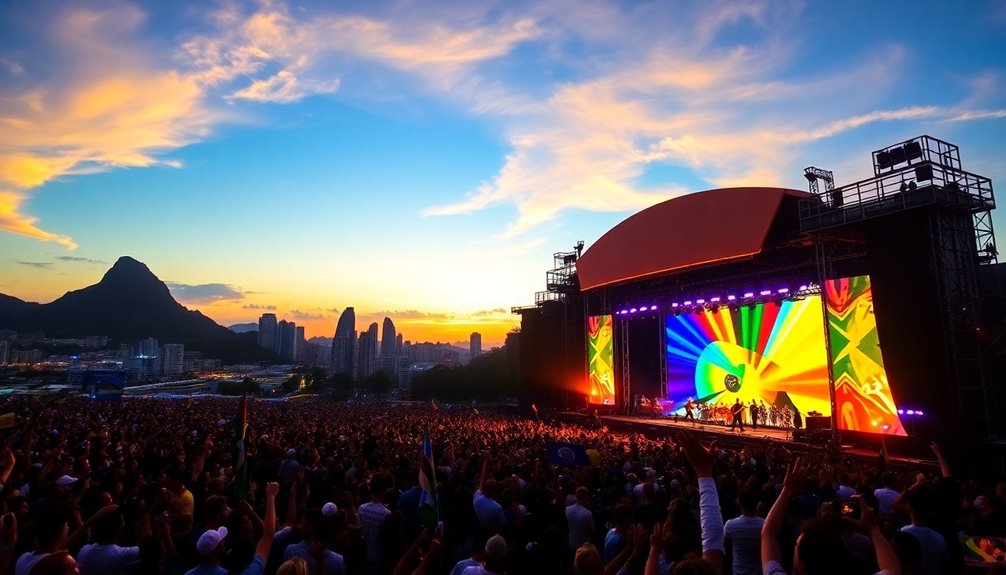
When the first Rock in Rio festival kicked off in 1985, it didn't just bring music to Brazil; it transformed the cultural landscape.
Attracting over 1.38 million people across ten days, this event was a game-changer. You witnessed legendary performances by acts like Queen, AC/DC, and Iron Maiden, which set a new standard for large-scale festivals in Brazil. With nearly 200 million viewers tuning in globally, the festival became a landmark in music history. The venue featured cutting-edge technology, showcasing a massive stage and full audience illumination, creating an unforgettable atmosphere. The festival's inception marked the beginning of a cultural phenomenon that would influence generations and inspire future festivals around the world.
Founder's Vision: Roberto Medina's Dream
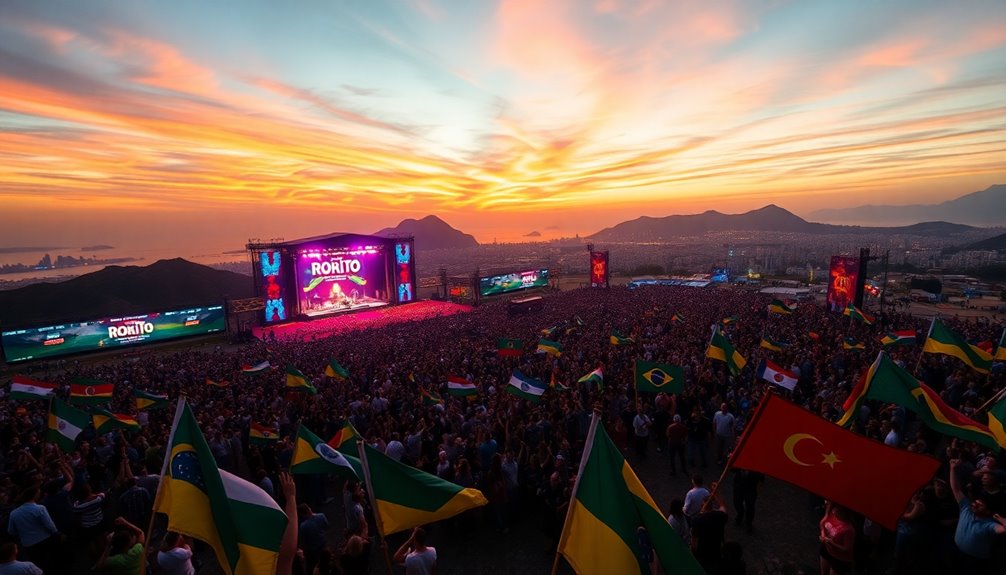
Roberto Medina envisioned Rock in Rio as more than just a music festival; it was meant to be a transformative cultural event that would unite people through the power of music.
From the start, he aimed to create an experience that blended international acts with local enthusiasm, establishing Brazil as a key player in the global music scene. The festival's impressive production, featuring the world's largest stage at the time, set new standards for music festivals in South America. Rock in Rio generates more revenue than the World Cup, showcasing its significant impact on the local economy and cultural landscape. This aligns with the Law of Attraction principles, emphasizing the power of positive experiences and collective energy.
Despite facing challenges, including a kidnapping incident, Medina's resilience and innovative marketing strategies fueled Rock in Rio's growth.
His dream expanded beyond Brazil, leading to successful editions in Lisbon and Madrid, solidifying its status as a global powerhouse in music and culture.
The Impact of the Inaugural Festival
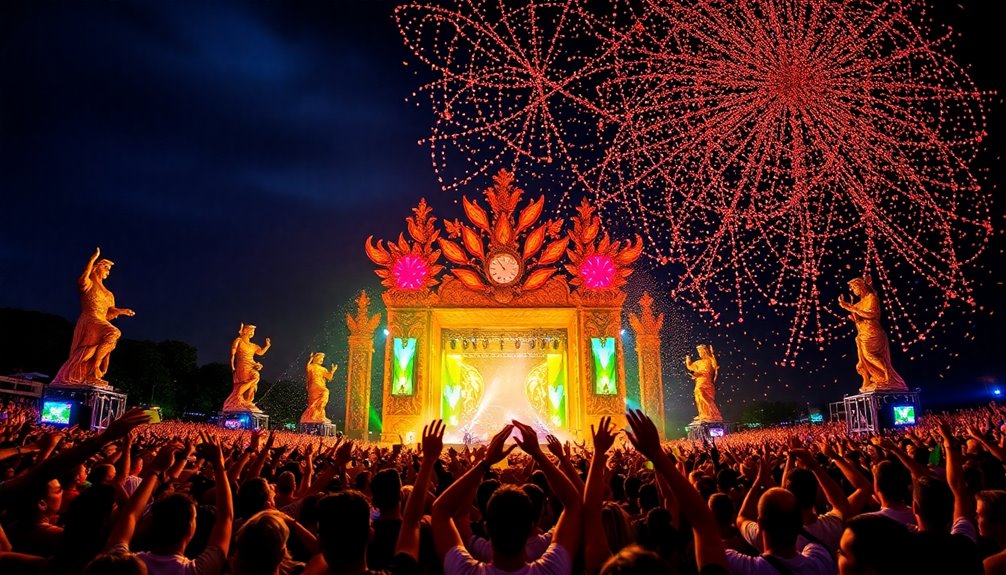
Although it was just the beginning, the inaugural Rock in Rio festival in 1985 made an undeniable impact on the music landscape. Attracting 1.38 million attendees, it set a record for music festivals, eclipsing Woodstock's attendance fivefold. Featuring legendary acts like Queen and Iron Maiden, the festival quickly became a cultural phenomenon in Brazil and beyond. This success not only solidified Rock in Rio's reputation but also contributed significantly to the local economy, creating over 139,500 jobs and boosting tourism. The festival provided a platform for civic engagement during Brazil's re-democratization, emphasizing social responsibility with initiatives like the "For a Better World" project. Additionally, it has since grown into a global event, with over 7 million attendees participating in various editions worldwide.
Business Model: Revenue Streams and Partnerships
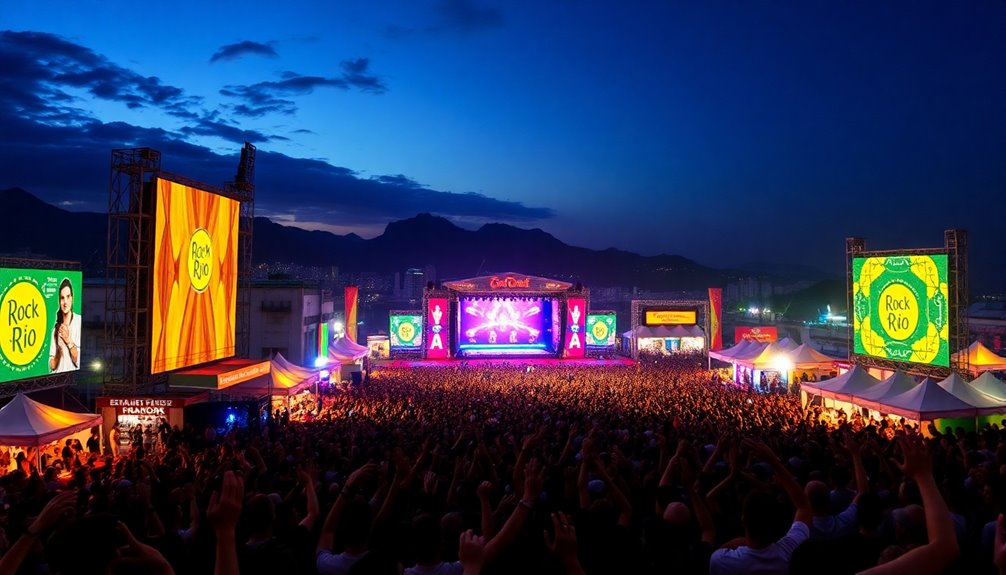
The business model of Rock in Rio thrives on diverse revenue streams and strategic partnerships that fuel its growth and sustainability.
Ticket sales are a primary source of income, complemented by licensing deals that extend the brand's reach. Sponsorships significantly boost revenue, allowing brands to connect with festival-goers. Merchandise sales add another layer, creating a tangible connection to the event. Media partnerships enhance visibility and profitability through exclusive rights. Festival Personalization initiatives, such as tailored gifts from sponsors, further enrich the attendee experience and drive engagement.
Key partnerships with artist managers ensure top-notch performances, while collaborations with media outlets promote the festival effectively. Government partnerships facilitate necessary permits, and suppliers provide logistical support.
Sustainability Efforts: Leading the Way in Eco-Conscious Events
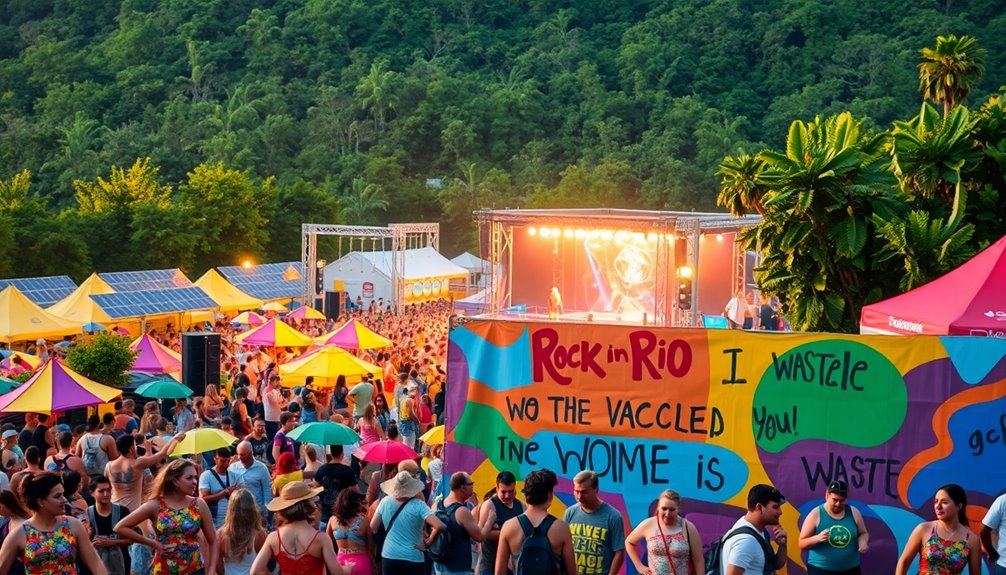
As Rock in Rio continues to grow as a global music powerhouse, it also sets an example in sustainability, leading the way for eco-conscious events.
Since 2006, you've helped offset 420,000 tons of carbon emissions and will use renewable energy for the 2024 festival. The installation of solar lighting and the use of electric vehicles further reduce your environmental impact. Additionally, Neoenergia's supporting role at the festival includes the installation of 43 solar-powered lighting poles, showcasing a commitment to renewable energy solutions.
With a zero-waste policy, you've recycled 80% of waste at past events, generating income for recycling cooperatives. Partnering with Neoenergia boosts your efforts, and the ISO 20121 certification highlights your commitment to sustainable management.
Global Expansion: From Rio to the World
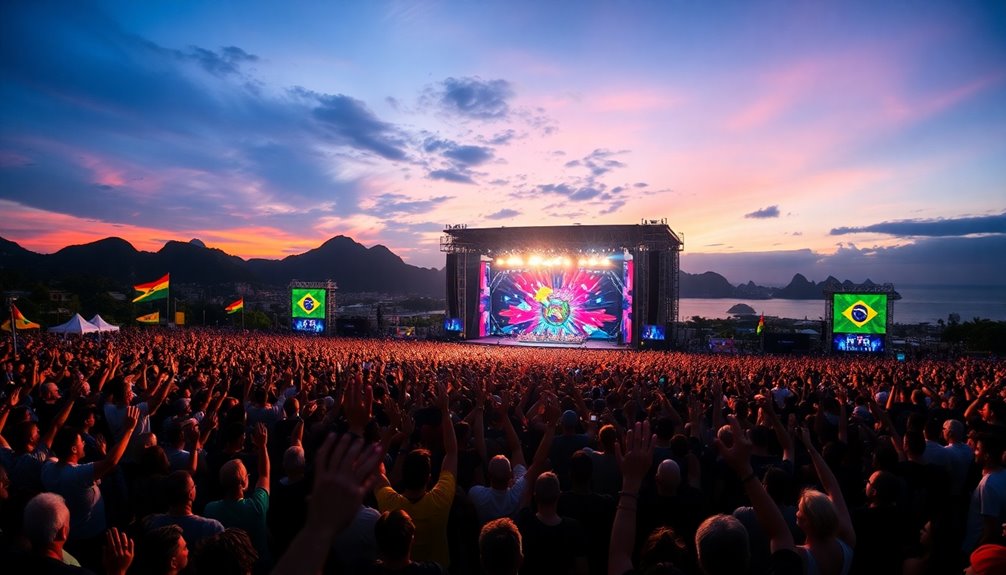
Since its inception, Rock in Rio has captivated audiences by expanding beyond its Brazilian roots to become a global music phenomenon.
In 2004, the festival took its first international step with the Lisbon edition, paving the way for events in Madrid, Las Vegas, and beyond. Each location draws hundreds of thousands, showcasing its adaptability and broad appeal. The first international edition solidified Rock in Rio as a global brand, influencing music cultures worldwide by featuring both local and international artists.
Strategic partnerships, including Live Nation's acquisition in 2018, have enhanced operations and secured top talent.
Technological Innovations: Setting New Standards in Production
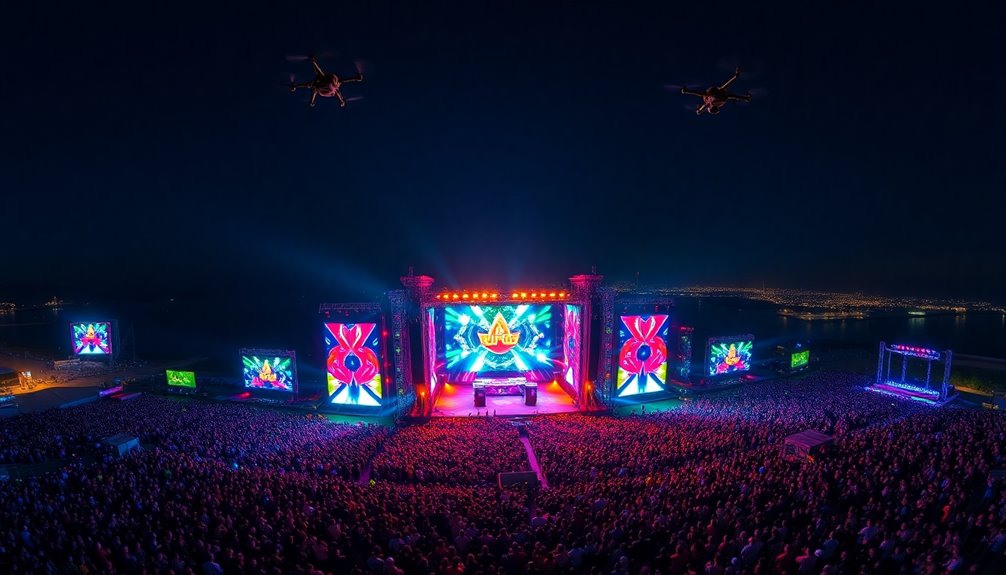
While many festivals rely on traditional production methods, Rock in Rio sets itself apart by embracing cutting-edge technological innovations that redefine the live music experience.
You'll enjoy personalized immersive sound and HDR video through MPEG-H technology, enhancing broadcasts by Rede Globo. The experimental 5G transmission elevates your viewing experience with high-quality content. With the enhanced SBTVD, content distribution becomes more efficient. The festival's broadcasts were canceled in 2020 due to the pandemic, highlighting the importance of advanced technology in adapting to challenges.
On the stage, grandMA2 consoles provide flexible lighting control, synchronizing effects across VIP and main areas. Automated followspots adapt dynamically, ensuring every moment is lit just right.
Collaborations with platforms like Zoox utilize big data to create personalized experiences, making your festival journey unforgettable. Rock in Rio is truly setting new standards in production technology.
Economic and Social Benefits for Host Cities
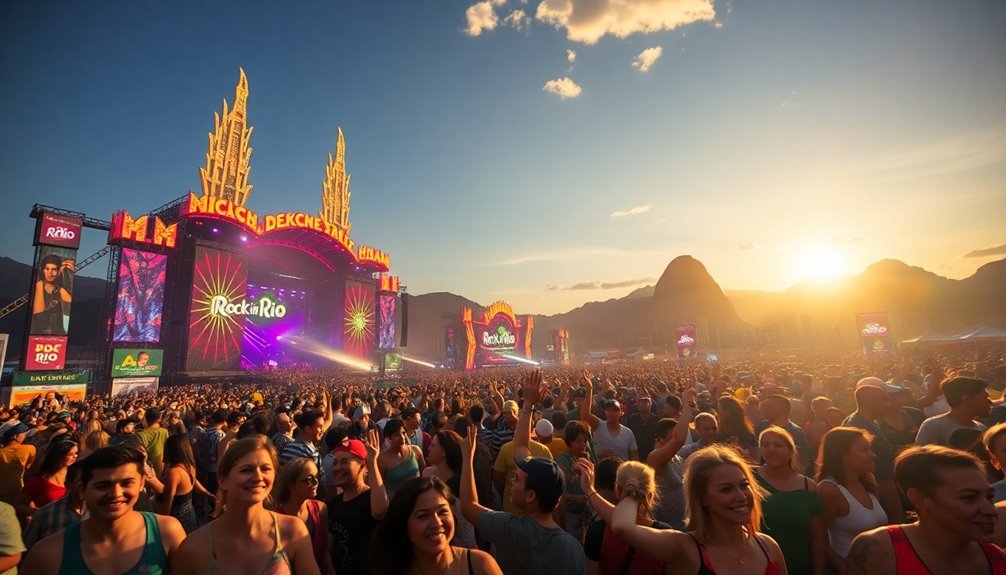
Rock in Rio isn't just a music festival; it's a powerhouse of economic and social benefits for its host cities.
With nearly $160 million in revenue generated, the event significantly boosts local economies. You'll see tax contributions, with around $8 million directed to Rio de Janeiro alone. The festival is expected to have a positive impact on the city, enhancing its profile as a tourist destination.
The festival creates thousands of jobs—32,600 expected in 2024—which stimulates various sectors like tourism and transportation.
Beyond economics, it fosters cultural exchange, engages local communities, and promotes sustainability through initiatives like "For a Better World."
Cultural Significance: Rock in Rio as a Symbol of Unity
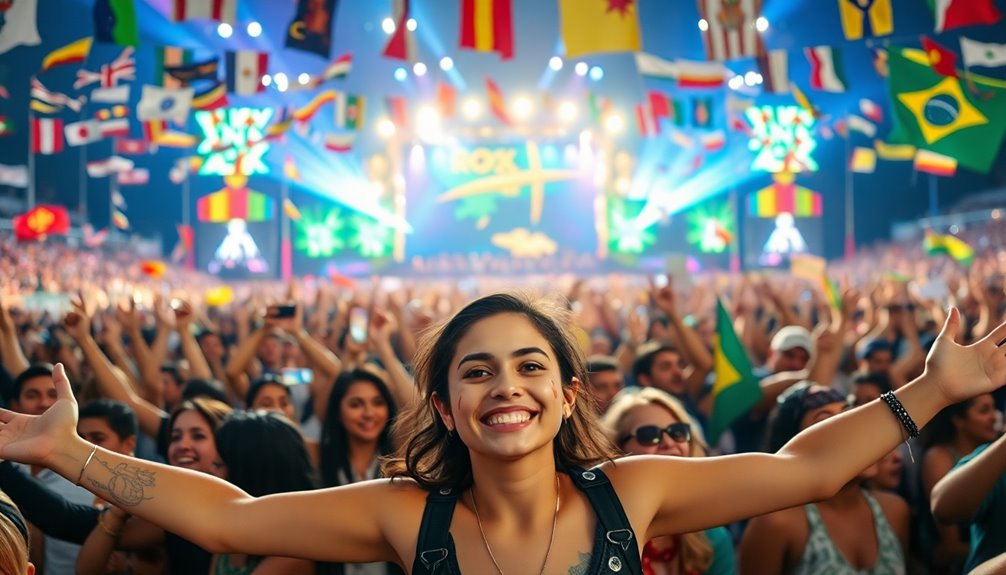
Unity resonates deeply at Rock in Rio, transcending borders and cultures through the universal language of music. Since its inception in 1985, the festival has become a symbol of freedom and cultural expression, especially during Brazil's democratic transition.
Attracting a global audience, it creates a vibrant melting pot, where diverse musical genres appeal to everyone. Iconic performances by legendary acts reinforce its significance, while recent events promote messages of peace and love. The festival's 50 young individuals from social institutions are invited to create lasting memories, exemplifying its commitment to social development through cultural experiences.
The Future of Rock in Rio: Continuing the Legacy
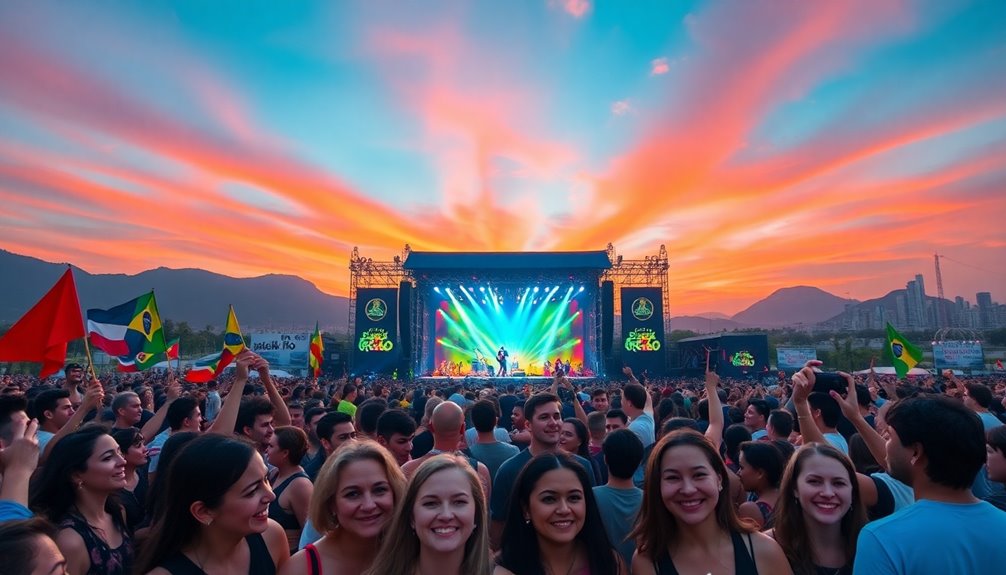
As the world evolves, so does the vision for Rock in Rio, ensuring its legacy continues to thrive.
You'll see the festival expand its global presence, reaching cities like Lisbon and Las Vegas, while hosting diverse international lineups that promote cultural exchange. This growth not only boosts local economies but also creates thousands of jobs, with future investments like the Imagine complex promising even more economic impact.
Technological innovations, including interactive experiences and sustainability initiatives, will enhance your festival experience.
Through public-private partnerships, Rock in Rio aims to solidify Rio's status as a cultural hub.
Frequently Asked Questions
What Unique Experiences Can Attendees Expect at Rock in Rio?
At Rock in Rio, you'll discover a vibrant mix of experiences.
You can explore diverse stages featuring various musical genres and enjoy giant rides like the Ferris Wheel.
Don't miss the cultural exhibitions and the Global Village, where you can savor culinary delights.
Engage with immersive installations like the ALL Experience Box and catch unique performances from Fuerza Bruta.
Plus, there are Instagrammable spots perfect for sharing your adventure with friends!
How Does Rock in Rio Choose Its Lineup of Artists?
When Rock in Rio chooses its lineup, it focuses on diversity and wide audience appeal.
You'll find a mix of genres featuring both globally recognized artists and emerging talent. They consider fan demand, cultural impact, and live performance quality.
Lineup announcements are strategically timed, using social media to create buzz.
While they aim for balance, challenges like artist availability and logistical factors can complicate the selection process.
What Safety Measures Are in Place for Festival Attendees?
When you attend the festival, you'll notice strict safety measures in place to protect everyone.
Expect thorough security checks at entrances, which help ensure no prohibited items like knives or firearms enter.
You won't see animals, except for assistance dogs.
Plus, the festival provides designated areas for those with reduced mobility.
With these measures, you can focus on enjoying the music and atmosphere, knowing your safety is a top priority.
Are There Age Restrictions for Attending Rock in Rio?
Yes, there are age restrictions for attending Rock in Rio.
If you're 16 or older, you can attend without supervision. However, if you're under 16, you must be accompanied by a parent or legal guardian.
Additionally, children under 5 need to leave the event by 10 PM, even if they're with an adult.
Make sure to have the required documentation, like the "termo de responsabilidade do acompanhante," for minors.
How Can Fans Get Involved in Rock in Rio Events?
Ever wondered how you can become part of the Rock in Rio magic?
You can get involved by purchasing tickets early and engaging with the festival through social media. Attend special events, volunteer, or participate in sustainability initiatives.
Consider exploring NFT options for unique experiences, and don't forget to share your journey online to connect with fellow fans.
Arriving early ensures you soak up everything this iconic festival has to offer!
Conclusion
As you stand amidst the vibrant crowds of Rock in Rio, you feel the heartbeat of a global community, each note echoing like a shared dream. This festival isn't just about music; it's a tapestry woven with hopes, cultures, and voices, singing in harmony. Just as a phoenix rises, Rock in Rio continues to soar, lighting the way for future generations to unite through the power of song, reminding us that together, we can create magic that lasts.










